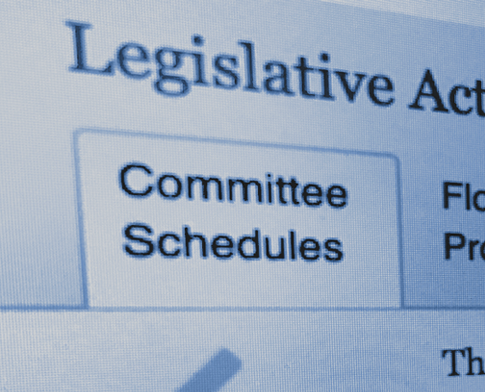Tax Update (March 30)
Proposed Legislation
H.R. 6177, the “Members of Congress Tax Liability and Garnishment Accountability Act of 2020”, introduced by House Minority Leader Kevin McCarthy (R-CA) would require lawmakers to disclose delinquent tax liabilities and wage garnishments, and would hold their salaries in escrow until their delinquent liabilities are paid.
H.R. 6185, the “Save Our Springs Act of 2020”, introduced by Rep. Debbie Wasserman Schultz (D-FL), would impose a $0.06 per gallon excise tax on water extracted from a spring or underground water source for use as bottled drinking water.
H.R. 6129, the “Safeguarding Americans From Epidemics (SAFE) at Work Act of 2020”, introduced by Rep. Ross Spano (R-FL) would allow a teleworking tax credit and reinstate limitations on itemized deductions for some years.
Congress Approves $2T COVID-19 Economic Relief Package
On Wednesday (Mar. 25), the Senate approved H.R. 748, the “Coronavirus Aid, Relief and Economic Security Act” (CARES Act) by a vote of 96-0. The $2 trillion relief bill is designed to help unemployed workers and small businesses survive the economic shutdown as coronavirus continues to spread across the country. The CARES Act also aims to prop up American health care providers who are reaching their capacity.
The final legislation, which was approved by the House by voice vote on Friday (Mar. 27), includes: cash payments to American citizens; dramatically increased healthcare spending; targeted relief for airlines and cargo air carriers, businesses deemed critical to national security, and states and municipalities; and a broad lending program for small businesses. A provision to extend the individual tax return filing date to July 15, 2020, was removed from the legislation following the IRS issuance of Notice 2020-18, which accomplished the same thing.
Click here to view a section by section summary of the legislation.
Click here to view the full legislative text.
Tax-related components can be found in Title 11 – Assistance for American Workers, Families, and Business, and include:
Subtitle B-Rebates and other Individual Provisions
- Recovery Rebates
- Retirement Provisions
- Charitable Contributions
- Treatment of Student Loans
Subtitle C-Business Provisions
- Employee Retention Credit
- Delay of Employer Payroll Taxes
- Treatment of Losses
- Corporate AMT Credits
- Limitation on Business Interest Expense
- Excise Tax Exemption for Hand Sanitizer
- TCJA Technical Corrections
Below, we summarize each of these provisions. As always, please contact CHCG if you have any questions or are in need of additional information on these or any other provisions relating to the CARES Act.
SUBTITLE B-REBATES AND OTHER INDIVIDUAL PROVISIONS
Recovery Rebates: The CARES Act provides for recovery checks of up to $1,200 ($2,400 for joint filers) for US Taxpayers making under $75,000 ($150,000 for joint filers). Rebates are increased by $500 for each child and will be based on 2019 tax returns, unless the individual has yet to file, in which case, the IRS will base rebates off 2018 returns. No action will be required to claim the rebates. Rebates are exempted from offset to pay debts owed to federal and state agencies.
Retirement Provisions: The CARES Act waives the 10% tax for early withdrawal of retirement plans and IRAs, related to coronavirus, of up to $100,000. The provision applies to individuals diagnosed with SARS-CoV-2 or COVID-19, ones whose spouses or dependents have been diagnosed with the disease, or one who has experienced financial hardship as a result of being quarantined, laid off, furloughed, or experienced reduced working hours or inability to work due to lack of child care. Amounts are to be repaid within a three-year from withdrawal date.
Additional provisions include: increased dollar amount available for loans from qualified plans from $50,000 to $100,000 and increased the percentage test limit for loans from half the present value of the participant’s benefit to the present value of his entire benefit under the plan; permits a one-year delay in required minimum distributions (RMDs) for defined contribution plans described in Code section 401(a), as well as for defined contribution plans described in section 403(a) and (b), IRAs, and section 457 plans; delays due dates for amendments to plans; delays minimum funding contributions for qualified plans; and expands circumstances under which the Secretary of Labor can postpone certain filing deadlines.
Charitable Contributions: the CARES Act allows a deduction of up to $300 of cash contributions for charitable donations regardless of whether a taxpayer itemizes deductions. Additionally, the legislation suspends the 50% limitation on individuals, increasing to 25% the 10% limitation on corporations, and increasing to 25% the 15% limitation on food inventory.
Treatment of Student Loans: the CARES Act expands the definition of employer-provided educational assistance that is excluded from gross income to include up to $5,250 in student loan payments made by an employer between the date of enactment and the end of 2020. Additionally, the CARES Act suspends involuntary collections on student loans, including by offsetting an income tax refund.
SUBTITLE C-BUSINESS PROVISIONS
Employee Retention Credit: The CARES Act provides eligible employers – including tax-exempt organizations but not governmental entities – a refundable credit against payroll tax (Social Security and Railroad Retirement) liability equal to 50% of the first $10,000 in wages per employee (including value of health plan benefits). In order to qualify, employers must have either 1) had business operations partially or fully suspended due to government limitations on commerce, travel, or group meeting; or 2), experience a year-over-year reduction in gross receipts of at least 50%.
For employers with more than 100 full-time employees, only employees who are not currently working due to COVID-19 related reasons are eligible.
Delay of Employer Payroll Taxes: The CARES Act postpones the due date for depositing employer payroll taxes and 50% of self-employment taxes related to Social Security and Railroad Retirement and attributable to wages paid during 2020. Deferred amounts will be payable over the next two years.
Treatment of Losses: Certain changes to the loss provisions made by the Tax Cuts and Jobs Act (TCJA) are suspended in an effort to allow companies to utilize greater losses as well as to claim refunds for certain losses. The CARES Act suspend the TCJA’s 80% of taxable income limit on net operating loss (NOL) carryovers, allows NOLs from 2018, 2019, and 2020 to be carried back five years, and suspends limitations on excess farm losses and the use of pass-through business losses against non-business income for three year.
Corporate AMT Credits: The corporate AMT was repealed as part of the TCJA, but corporate AMT credits are allowed as refundable credits until 2021. The CARES Act accelerates the ability for companies to recover those AMT credits.
Limitation on Business Interest Expense: The CARES Act would temporarily increase the limitation on interest deductions imposed by the TCJA. The Act increases the 30% of adjusted taxable income (ATI) threshold to 50% of ATI, for tax years beginning in 2019 and 2020, and allows a taxpayer to elect to use tax year 2019 ATI in lieu of tax year 2020 ATI for the purpose of calculating its tax year 2020 limitation.
Excise Tax Exemption for Hand Sanitizer: The CARES Act exempts from excise taxes any distilled spirits removed during 2020 for use in hand sanitizer.
TCJA Technical Corrections: The CARES Act would adopt the following TCJA technical corrections, on a permanent basis: Qualified improvement property; Effective date of NOL provisions; and Technical corrections related to section 461(l).
HOUSE.GOV
The Week Ahead
For the main events of the next week and more, go straight to the key events on the house.gov website.
SENATE.GOV
The Week Ahead
For the main events of the next week and more, go straight to the key events on the senate.gov website.


